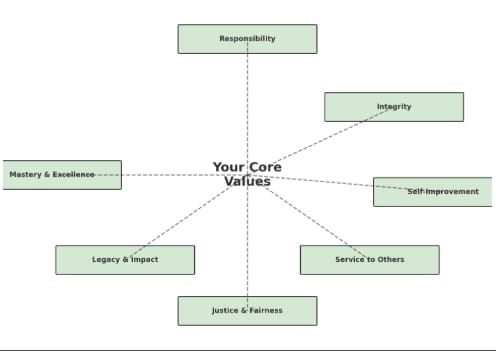- The Digital Heirloom
- Posts
- I asked AI for help in exploring my core values
I asked AI for help in exploring my core values
This is what happened after 45 minutes

Cores aren’t static. They’re molten balls of pressurized material wrapped inside something that takes in external stimuli and evolves with it over time.
When I talked about exploring your core values and principles in the previous series of this newsletter, it occurred to me to that integrating AI into the mix would be far more beneficial than me just spouting on about everything that I’m sharing with you.
99% of the time, you can’t sit down and spend even a few minutes (much less the amount you take out of your day to read anything useful). We all have multiple roles and responsibilities from putting our pants on in the morning to ensuring the financial stability of our children.
With such overwhelm that occupies all your waking hours, you need more bang for your buck.
So when I realized that I needed to up the quality of my writing and what I share here, I needed a guinea pig to validate it.
No better piggy than me, right?
So I asked ChatGPT for help using the following prompt:
You play the role of a professional therapist or profiler. Can you come up with a series of questions to ask me so that you can then provide me with a list of 5 to 7 core values that you determine I may have? Please ask me 15 questions in this series before providing this list.The following are the questions it provided to me and the results that I got once I shared them.
Here’s what happened over the 45-minute session with it as my digital assistant.
The results are nothing if not illuminating as to the true potential of this tool.
The questionnaire
These are the prompts that it returned for me to answer.
I had a few rules for myself (that I’ve mentioned in previous issues):
Don’t hesitate - stream of consciousness only
Don’t force answers - if one word worked, then that’s it, you’ll feel it when you’re done
Don’t sugarcoat anything - suspend any fear of judgment (it’s not Skynet…yet)
Without further ado, here are the questions.
1. What is something you've done in your life that you're most proud of—and why?
2. When you feel most fulfilled or “in flow,” what are you usually doing?
3. Think back to a time you were extremely angry or upset. What was the situation, and what values do you think were being violated?
4. Who do you deeply admire, and what qualities or actions make you feel that way?
5. What kind of legacy do you hope to leave behind for your children, family, or community?
6. What types of compliments mean the most to you?
7. Describe a time when you stood up for something or someone—even when it was difficult.
8. If you had unlimited time and resources, what causes, hobbies, or projects would you pursue?
9. What kinds of environments or social settings make you feel the most alive, connected, or energized?
10. When making big decisions, what do you usually prioritize above all else?
11. Describe your ideal day from beginning to end. What does that day include?
12. What kind of behavior in others instantly earns your respect?
13. What kind of behavior in others instantly loses your respect?
14. What have been some of the most difficult lessons you’ve had to learn?
15. If everything in your life were stripped away—career, status, possessions—what beliefs or principles would still guide your actions?
When nobody else has the time for you…
It took me about 45 minutes.
I went through all 15 questions to write out a 1500-word response and popped them back in.
The results aren’t alarming or surprising, and I asked it to provide a visual of my seven core values:

My visual chart of my core values from ChatGPT.
If you’ve been reading here for awhile, then you probably have some sort of impression about me. Feel free to let me know if they align. Personally, I think this newsletter touches on every single one of these.
My growing respect for AI
As I explore this technology further, I’m beginning to realize something:
The right way and a wrong way to use AI are both equally powerful in their own right.
This newsletter is starting to share my findings on how to use it the right way; how to make it a powerful mirror of infinite possibilities for yourself to become the best that you can be. Abuse of this technology can very easily strip you of everything that you represent and force you to become a caricature of yourself; a hollowed-out shell with an infinite echo chamber.
Used properly, the upper portion of Maslow’s hierarchy of needs can be realized much more effectively.
It’s the difference between overdriving your headlights in the dead of night and a Sunday drive with road signs to your favorite café.
There’s a lot more to tinker with, and I intend to share and teach what I discover as I move forward.
Try it for yourself.
If you didn’t do it the first time I offered, consider this a standalone invitation with actual results with myself as a case study. You certainly have nothing to lose if you don’t take action, but I’m beginning to realize that you have so much to gain if you do.
Reply